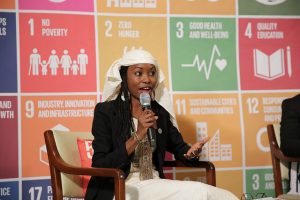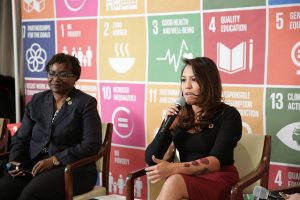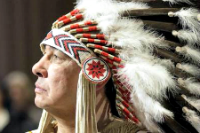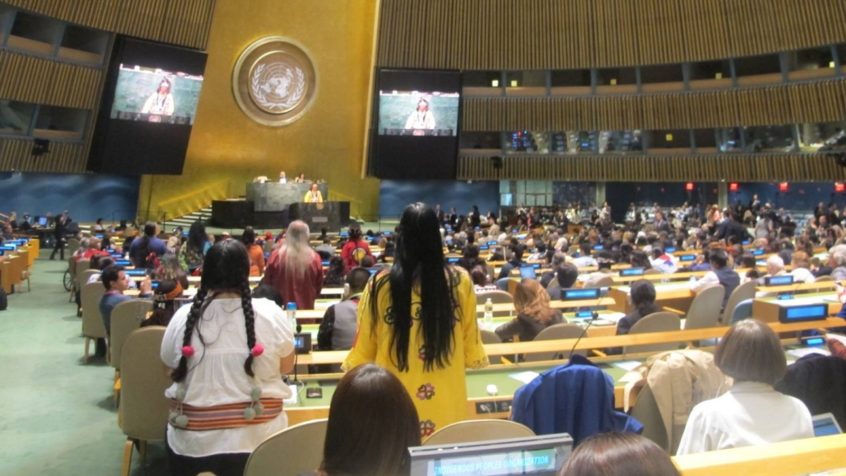 The annual session of the UN Permanent Forum on Indigenous Issues
The annual session of the UN Permanent Forum on Indigenous Issues
The Permanent Forum on Indigenous Issues’ annual session takes place in April or May each year in New York. Indigenous youth from all regions are among the 1000 of participants attending the Session.
In 2016 at the 15th UNPFII Session, the Permanent Forum decided to include a specific discussion about indigenous youth on their programme of work for future sessions.
The Global Indigenous Youth Caucus typically meets before the session to discuss issues related particularly to indigenous youth and children – and to coordinate interventions and statements during the session. Read more about the caucus here.
At the Permanent Forum’s annual session, Member States, UN programmes, funds and agencies, National Human Rights Institutions and others report on their activities related to indigenous peoples, including children and youth. The Permanent Forum also discusses current issues related to their mandated areas of health, education, the environment, culture, human rights, and Social and economic development.
More young indigenous people are needed at the annual session of the UNPFII and in the work of the Forum to give their own views of the world in which they live. By participating, you can help to shape the advice the Permanent Forum gives to UN agencies, especially concerning indigenous youth. And when you return to your homes after the meeting to share your experiences, what you have learned, and what you have contributed, you help the Permanent Forum’s efforts to disseminate more information about its work.
ECOSOC Youth Forum
The annual ECOSOC Youth Forum provides an intergovernmental platform for young people to have a voice in the UN – and in addressing their unique development challenges and contribute to the achievement of the 2030 Agenda for Sustainable Development.
In 2017, several young indigenous persons participated at the 6th ECOSOC Youth Forum. In particular, they drew attention to the importance of securing indigenous peoples’, including indigenous youths’, access to secure land rights in order to achieve the ambitions of the Sustainable Development Goals. Further, the importance of overcoming violence against indigenous women was emphasised in several platforms of the meeting. In particular, the indigenous youth participated in:
- The break-out session on SDG 2: End hunger, achieve food security and improved nutrition and promote sustainable agriculture
Ms. Hindou Oumarou Ibrahim, an indigenous women’s rights activist from Chad, participated as main speaker at the break-out session and led a sub-group discussing the importance of acknowledging individual and collective land rights, also in the framework of the 2030 Agenda and Goal 1, with indicator 1.4.2 referring to collective land tenure.
- Indigenous Women in the SDG media zone
The Panel debate on Youth and Inequalities included a young indigenous woman from Canada, Nikke Fraser, who is a National Youth Representative from the Native Women’s Association of Canada and Young Leader for the SDGs. Watch the panel here.
The Panel debate on Africa’s Youth’s role in Realization of the SDGs was moderated by Ms. Hindou Oumarou Ibrahim from Chad. Watch the panel here.
- Outcomes of the 6th ECOSOC Youth Forum
The Presidential Statement of the 6th ECOSOC Youth Forum presenting the key messages drawn from discussions highlighted the importance of secure land rights.
Read more about the ECOSOC Youth Forum here: 6th ECOSOC Youth Forum
Commission on the Status of Women
The 2017 CSW Youth Forum will take place from 11-12th of March, leading up to the main 61st Session of the CSW from 13th to 24th of March 2017.
Indigenous youth have been invited to participate – and some of the panel discussions will focus on the emerging theme/focus are of 61st CSW “Empowerment of Indigenous Women”, seen from a youth perspective.
How can I get involved?
Some funding is available specifically for indigenous participation, including youth, in the Permanent Forum meeting. If you are interested in applying for funding, click here.
You will need to get organized a long time in advance because funding for meetings must be considered in the year before the meeting is held (applications typically close October in the year before the meeting).
Employment opportunities at the United Nations for young people:
Junior Professionals are recruited through the Young professionals programme (YPP). The YPP is a recruitment initiative that brings new talent to the United Nations through an annual entrance examination. For young, high-calibre professionals across the globe, the examination is a platform for launching a career at the United Nations. This programme builds upon the national competitive recruitment examination (NCRE). For more information on the Young Professionals Programme click here >>>
Other websites posting international jobs: UN Careers (the main portal for employment opportunities at the UN)


